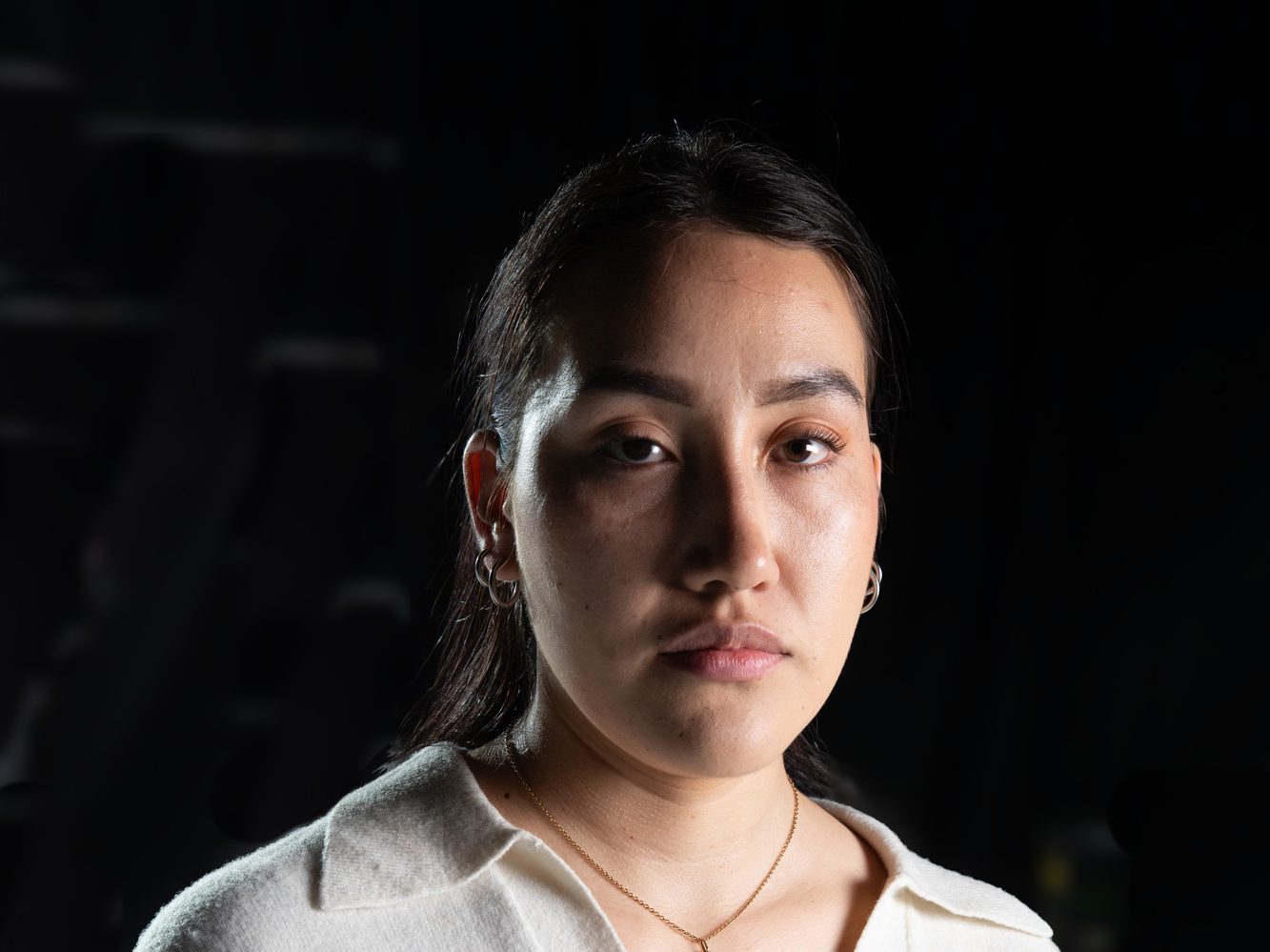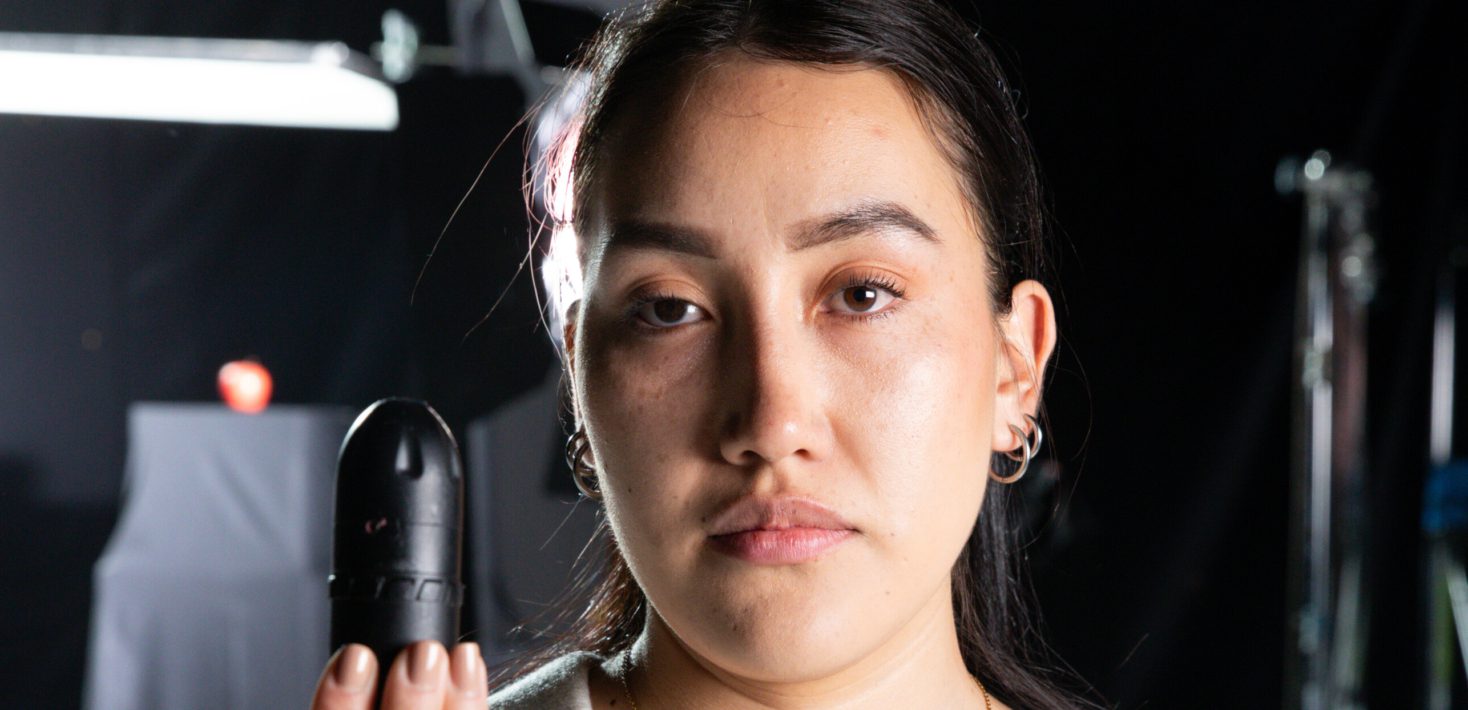Leidy Cadena, a political science student from Colombia, was demonstrating in central Bogotá on 28 April 2021, when she was shot in the eye with a rubber bullet by a member of the police. Leidy lost an eye in the attack and her case became emblematic across the country.
Leidy was the first person in Colombia to lose an eye at the hands of the police during that year’s National Strike. After she was shot, she filed a complaint with the police, she was interviewed about what happened at least 10 times and received threats on social media which eventually forced her to leave her country.
Here, the 24-year-old shares the story of what happened to her, how she’s rebuilt her life and why she remains unafraid to protest.
I went to my first protest in 2016. It was against the Corridas (bull fighting) in Bogotá. Shortly after the protest, a stop was put to bull fighting in the city. It had worked!
Protesting, to me, was so important and I felt like it was my responsibility to participate. It was a way to change things. That’s why I started studying political science.
Just before Covid, the police killed Dylan Cruz during a protest. People were angry. When things returned to normal post-pandemic, prices started rising, people didn’t have jobs. There was a big economic crisis in Colombia, and people started taking to the streets again.
Where I was living people didn’t have anything to eat. As students, my boyfriend, Sebastián and I, had to pay for education when it should have been free. That’s what pushed us to go and protest in 2021.

I remember getting up early on 28 April. I made some Instagram videos, telling people to come and protest with us, then I cycled to my boyfriend’s house and we went out – we didn’t have a clear direction, we just wanted to protest. It was raining, so we met friends and went to Plaza de Bolívar, where people usually congregate.
It was busy, so we left our bikes in the park.
Police started firing tear gas
While we were peacefully demonstrating, singing and chanting, the police started firing tear gas and people started running, I said, ‘Calm down, let’s walk not run.’ At that point, I was close to where I worked – we thought it would be calmer. I just needed to cross a bridge to get there, but the police were throwing tear gas, preventing people from walking across. I said to my friends. ‘Let’s put our hands up and walk across calmly – they won’t attack us.’ But as we were crossing, a police officer started screaming at us and taunting us.
I told them we were just walking past. We wanted to go home, but we had to get our bikes. A police officer told us it was too dangerous to get back to our bikes – so it would be best to go around the neighbourhood.
That’s when I was assaulted.
I stopped for just a moment, together with Sebastián, my friends Camilo and Karina, a Chilean war journalist who was documenting the protest. One of Sebastián’s friends tried to ask if we could exit the street and the police started saying horrible things. He tried to walk away, but they grabbed him and hit him.
The police officer rudely told us, ‘You shouldn’t be here.’ I was close to him and told him, ‘We haven’t done anything.’ Then boom, everything went black.
I put my hands to my face and felt something wet. I started screaming for Sebastian. He arrived and grabbed my arms. I couldn’t see anything. He told me to stay calm, everything would be ok. But I had a feeling my eye had popped out.
I took my mobile phone and took a photo, but in that moment I couldn’t see anything. Sebastián let me go and left. I later learnt he had gone to get the identification number of the police officer who had assaulted me – it was important to identify him.
I knew I was blind in one eye
While I was in the ambulance, I could feel Sebastián’s nerves. He could see how bad my injury was. I knew I was blind in one eye.
I tried to remain calm. Sebastián told me we were going to the doctor and that I’d be fine.
When we arrived at the hospital, the doctor told me my eye had exploded, because I was hit directly in the eye with a blunt object.
My first phone call was to my mother, to tell her what happened. While I was in the hospital, my friends were calling me to tell me that people who had attended the protests were being disappeared. They told me to go public with what had happened to me. So I went live on a page called Primera Linea Col . I said that a police officer had assaulted me and told my story. The live was shared by lots of people, including influencers and actors, including Julián Román. Around 2am, five million people were sharing what I had posted. During that time, my Facebook and Instagram account were closed. I tried to communicate with Instagram but no one ever responded. I am lucky it was just my social media platforms that disappeared – not me.
It was police violence
After I left hospital, I eventually managed to find a lawyer. The police met me at his office to file my complaint. The police kept trying to interrupt me during my testimony and at one point, they told me to file it as a personal injury, rather than police violence. My lawyer and I both said, ‘No, it’s police violence and abuse of power.’ But they refused to listen to us. After that, I was interviewed about what happened at least 10 times by various police departments.
Throughout my recovery, I remained grateful to my family, as well as Sebastián’s. My mum worked nights, but she was worried about me, so she asked Sebastián to come and live with us. However, the neighbour started noticing different cars outside my house. I tried not to let it affect me, but eventually I went to stay with Sebastián. Soon after, my mum called me crying. A powdered substance had been posted through the door. It started burning the carpet while my family were at home.
That’s when I realized I had to leave Colombia. I contacted Amnesty International and told them everything. I didn’t have a passport, so they helped me get one. Then I sold my things and left for Norway, with Sebastián and my mother. When I arrived in Norway I was detained in a detention facility, but Amnesty was there to support me and help me communicate.
Finding my feet again
After two years away, I finally feel comfortable in Norway – I can see some of the possibilities of being outside of Colombia. I can speak freely and get involved with activism. I am learning Norwegian and I work part time in a Kindergarten, which I love.
In the beginning I wanted to be back home and change things for the better. But I can see my life is in Norway now – that’s why I decided to bring my cats over. I am learning the language and I have accepted for safety reasons that this is the best place for me.
Even though we are alone in this city, I am starting to find happiness in small things – my cats make me happy, I can travel and see new things. I recently met my niece for the first time – so to be able to see her and witness her take her first steps has motivated me to create a better world for her.

As for Colombia, there aren’t as many protests at the moment. There’s a lot of young people in prison, people have been disappeared and to date, more than 100 people have suffered eye injuries. People are scared to protest, but I know they’re focused on achieving justice and holding the government to account. Likewise, governments in countries such as the USA and Brazil who are allowing sales of these so-called less lethal weapons to the Colombian security forces must be held accountable too. Placing these weapons in the hands of abusive security forces puts people at risk of being tortured and maimed – like I was.
Despite my injury, I am still passionate about activism. Protesting is the strongest way to come together and show the world that you don’t agree with something. It is our right to go out on the street and take over the public space and say, ‘I am not OK with that.’ I don’t have any hatred for anyone. Afterall, what saved my life is love. Love from the people around me. That’s something I want to see more of. Everyone makes mistakes, but if we can come together as communities and respect and love each other, the world can be a better place.


